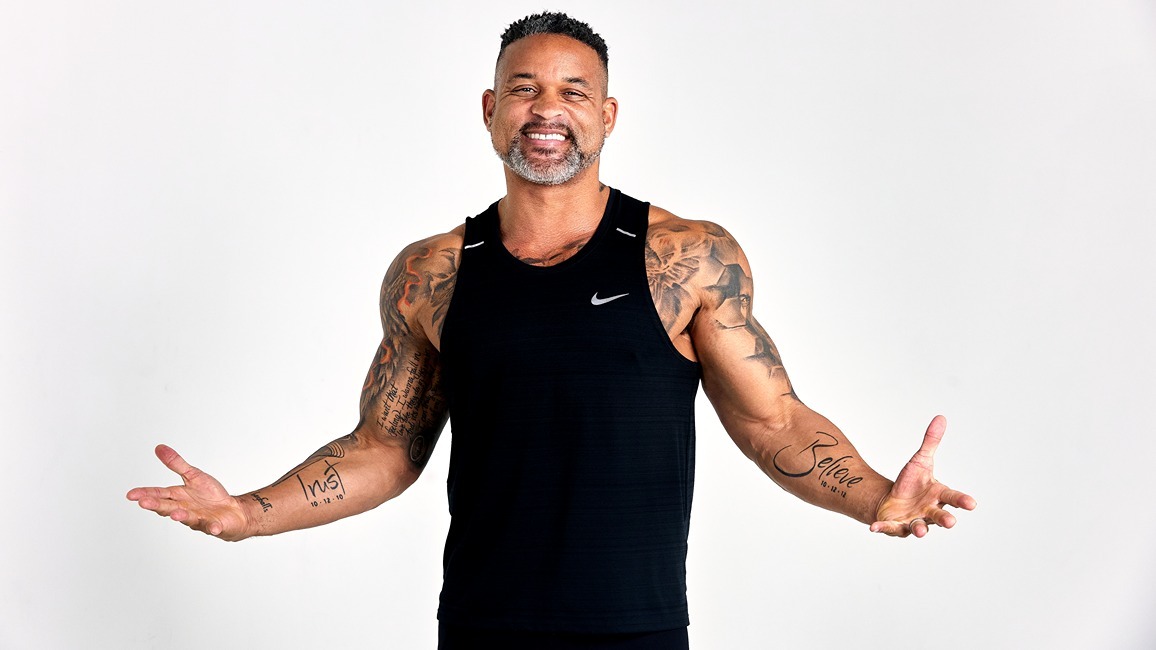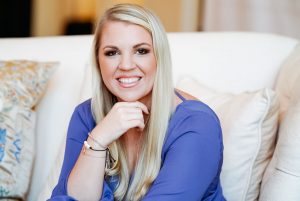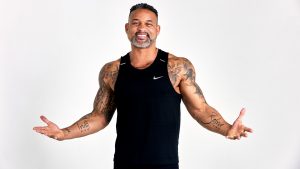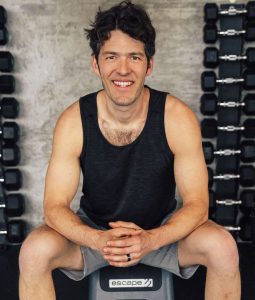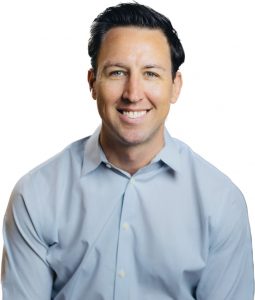SHAWN STEVENSON: Welcome back to the Family Health and Fitness Summit. We’ve got an icon alert. We’ve got an icon alert. So many families, kids, all the way up to our senior folks have rocked out, have danced, have exercised with our special guest, and now we’re going to get a peek inside of his world to see how he’s created a culture of wellness and connection in his family. We’ve got the one and only Shaun T, what’s up my brother?
SHAUN T: What’s up? I was going to drop that. What do you know about icon living? Hey.
SHAWN STEVENSON: Come on. That’s how we’re doing it. That’s how we’re doing it already. Real talk. You’re one of my favorite people, love talking with you and you’re one of them, which is strange to say this, but just a real one. And somebody who’s been living with authenticity is going through your own challenges, but being able to operate at such a high level to impact the lives of so many and to stay so real in the process is so refreshing. And I just love that about you, man. I’m very, very grateful to have you on today.
SHAUN T: Thank you. And I feel the same exact way about you. I think that’s a magnetic force to people like us. When you just find somebody, you’re just like, they’re a real one. And I think the cool thing about just living in that authentic space is when you live in an authentic space, you look at people differently. So for me, I live in such an authentic space where I can see people who I may not agree with or they may not agree with me, or they may have different opinions, and I’m like, “Cool,” because you’re living in your truth. And that’s where that common ground of respect comes in, because I’m like, “You have an entire world that shaped you to be the way you are and to react the way you are. And I’m not going to shun you from that.” I’ll talk to you about it even more. And I think that’s what I absolutely love about you, just being fearless, knowing that things for people can be controversial, but you’re like, “Yo, this is it.” And it doesn’t come with some BS. It comes with a real authentic place of processing exactly how you are. And that’s exactly how I am. So when you operate on that same wavelength, it just works.
SHAWN STEVENSON: There it is, real recognize real, as they say. Now with this being said, this is a summit about family empowerment. This is a summit about real wellness. As you know our society it’s in an interesting time right now, and we’ve been a little bit more fractured as a culture, more fractured as families, and also our health has been struggling, and you’ve really, really been an icon in helping to address one of these core needs, is core for movement, but not just movement itself, but a joy in movement and being able to imbue that into it. And so, first and foremost, being that this is about family wellness, I want to ask you, why is family connection and wellness important to you, Shaun T?
SHAUN T: Family wellness and connection is important to me purely for the mental health benefit. Obviously physical health, we can talk about all day, physical health, we can literally feel it, see the changes when it comes to weight gain, weight loss, how food or exercise affects your body, be it something as simple as pimples or weight gain or whatever. But when it comes to mental health, it’s the hidden thing that doesn’t get enough power and it doesn’t get enough attention. And when it comes to the word power, people don’t understand that mental health is the driving force. It is the fuel for you to be able to be successful in the physical health space because you only make decisions if you think correctly about the decision you’re going to make. And when it comes to family… My grandfather taught me this a long time ago…
SHAUN T: I remember I used to go on these hikes with him on a Saturday, maybe eight o’clock in the morning, he would be like, “Come on, Shawnee, go out.” And we would get us… He would tell me to pick a stick, and we were walking in the woods. And that was our bonding time of just being able, he used to tell me like, “The family unit is so important. If you ever have a family, it’s really important for you to find ways to connect.” And that was his way of connecting with me. And it was rare times that he took my brother and I out at the same time. ’cause he was super, super intentional about being able to spend individual time with us. And so that just really resonated with me. I was probably five years old when I remember grabbing my stick and going out in the woods the first time.
SHAUN T: And I just remember one time we were, to me, we were deep in the woods. We were probably only like 500 feet, but I just remember him stopping and just asking me how I feel, “What do you think you’re really great at?” And these kind of things. And I thought that was really interesting. And then when I got older, he was like, “You know, when you were a kid, I remember asking you what you enjoyed.” And he was like, “I think I got it.” He was like, “You’re the three Ss.” He was like, “You’re powerful in the three Ss.” And I was like, “Oh gosh.” I was like, “What is this?” And he was like, “Swimming,” because even though I wasn’t on a swim team, I was a really, really good swimmer. I wish I would’ve done it, “Swimming, singing, and sprinting.” He was like, “You’re a great swimmer, you can sing,” ’cause I sang in the gospel choir and I was really fast in track and field. That’s where I excelled in sport. And I think just the connection of that was just really, really profound.
SHAUN T: But that also, that connection that he had when it came to family it transferred to the dinner table. ’cause we would take turns reading this book called ‘The Daily Bread’, and then whatever the message was about The Daily Bread, everyone would have to talk about it. He never had to ask, “Are you sad? Are you happy? What’s going on in your life?” Because this passage would prompt conversation and it was an easy way for him to connect with you. And so even though you know, and a lot of people know I went through very challenging times in my life, mental health for me was… Mental health and by way of connection with family was probably a really strong foundation, which, I’m having a therapeutic moment right now, which is probably why it’s still ingrained in my DNA and the foundation of who I am. So that is why, for me, family connection and wellness is extremely important.
SHAWN STEVENSON: Ooh, it’s so fitting that you said deep into the woods, deep in the woods with your caregiver. And this is something that we can all strive to do truly. We’ve all got so much going on in our lives, but you’re the first person to mention this, which I’ve seen is a consistency for a lot of the experts, is having that one-on-one time with our family, with our kids, with our significant other. You just came back from a one-on-one trip for your anniversary with Scott, but carving out that time to be present, because a lot of things, I’m very family-oriented with my family, so a lot of things that I do, I get the family involved altogether at one time, and so it’s an extra step for me to do one-on-one.
SHAWN STEVENSON: Because a long time ago I had it just kind of like a little switch in my mind of like, “We can get all this together in one. All of us could do this together,” and then missing out on occasionally those one-on-one moments. And so I’ve been able to find those times. For some people it’s just the drive. It’s the drive to school or to practice, or this could be something a little bit more elaborate. Like my oldest son, I took him to some football camps. Him and I got on a flight and went to Stanford and went to whatever the case might be, for football. We got to spend time together and hang out at the Airbnb together. It’s just those moments, looking back on it, our bond changed, our connection changed from those moments. And so thank you for bringing that up because, again, I know you’ve experienced this as well, but when you ask people what matters most to them, a lot of times they’ll say their family, but our schedules don’t tend to demonstrate what matters most to us. Can you speak to that a little bit?
SHAUN T: Yes, very true. I just wanted to also add, Scott and I are very intentional about spending time together. When I was going through my prep for my bodybuilding competition, I just remember having energy to work out, and that was it. I would come home and just want to go to sleep. And then there’s obviously, I have to eat very specific eating and then giving energy to the kids. And when the kids went to bed, I still had to be very, very intentional with having conversation about… All the attention is on me because I’m going through this transition and have a goal to go after. But I’m still in my head like, okay, when it comes to being in a relationship, intimacy, not just physical intimacy, but mental intimacy, is extremely important. So I would make… It was so important for me every single night to carve out time to have a conversation with Scott that wasn’t about my competition, that wasn’t about the kids, that wasn’t about anything except for just us being.
SHAUN T: And then that also translates to us with our kids. My kids are five, they’re almost six years old, so what am I going to do with them? One of the things that they like to do is they like to go to Target. So I’m like, we’ll take one of them to Target, or we’ll do it as a family, but oftentimes Scott will have a date day with one of the kids and I will with the other, and we’ll go to Target. And you think they’re going to buy toys. And then they sit down and they read a book and they’re like, “Can you read me a book?” In the middle of Target, and I’m like, “Absolutely.” It’s those things that are super surprising when you actually do carve out time to have that one-on-one time with your kids. So that was really important. But what was the question I was supposed to be answering?
SHAWN STEVENSON: You’ve already answered it really, but just looking at today with our priorities, again, with all this stuff going on, you with the, even most recently, taking on this challenge with the bodybuilding competition, in addition to some of the daily stuff that are your obligations with work, being a father, being a husband, and being able to, you have it on your shirt right now, dig deeper. In some instances, we’re talking about that investment in our relationships because here’s the thing, that investment pays back dividends that helps you in all those other things. You said it starting off, that connection is for that mental wellness first and foremost.
SHAUN T: Yes, yes. So for me just carving out time… There’s a lot of people who don’t live this way and they probably disagree with me and I’m completely fine, but I’m like, my family comes first. Even to this, literally the conversation I was having before this, there were some asks of me for work, and they’re like, “Oh, can you do this?” Or you haven’t been this, or whatever. And I was like, “I was spending time with my husband.” I’m like, “These people can wait. Because these people come and go, this is with me until one of us takes our last breath. So those little messages or those little things that these people, these little gems that these people are going to get from me that you’re asking me for, first of all, I’m giving them enough, but number two, no,” even it comes down to this and people would disagree.
SHAUN T: People are like, “Oh, my kids are the most important.” I’m like, “No, Scott is the most important because our unit takes care of them.” We don’t look at our kids to connect with each other. We feel like there’s power in us being together, and then of course, they’re the most important things. But in order to make them the most important, we have to carve out time to be together, to be strong, and then we can make decisions that are based on all of our needs and looking at the big picture, and then being able to actually talk about it after we have a conversation that may create some sort of action or reaction with our kids. So just carving, I just think that people just have to stop being afraid to talk, stop being afraid to talk. And it goes into… When it comes to a work situation, stop being afraid to say no.
SHAUN T: If something’s not pressing and you have to be there with your family, that’s most important. The last thing I’ll say is I know a lot of people, and Scott and I have this conversation, all families have issues, all these family issues, stuff is going on. And I want to preface this by saying, I’m not saying that you should let people be rude to you or walk all over you or be disrespectful to you or go above and beyond boundaries. But when it comes to family and connection and carving out time, the one thing I think about is I’m like, “Okay,” oftentimes families are going through stuff. They disconnect, if you will, and then there’s going to be a little bit morbid, but then something negative happens or bad happens healthwise and someone’s on their death bed and then they start talking like, “It’s okay. I know. Don’t worry.”
SHAUN T: People try to mend these fences in the last breath. And I’m like, “Why are y’all waiting until the last breath? Mend the fences now,” if it can be mended, if it’s something that you can possibly get over, do it now. Carve out that time now, that’s going to elevate your energy. It’s going to elevate your experience. It’s going to elevate your family dynamic. Again, we all have challenges. We all go through stuff. Just like you said, Anne comes in there and lets you have it before the show. But guess what? Real, honest, authentic conversation brings out togetherness on the other side. So make time, whether it’s good or whether you have to deal with an issue that’s not so good, making time, carving out time, putting the family first to me is… It’s literally just the most important thing ’cause you’re spending most of your time with them.
SHAWN STEVENSON: Yeah, and this should be captain obvious, but it’s not. Again, we don’t address the monster while it’s little, we allow it to get big and become a really big task to handle. But if we have those touch points and that time just to have open discussions about things, you were just sharing that that you guys were just talking about things that were different from your daily day-to-day conversations. Just even creating time for that is super important. And when you shared your connection being first, this is one of those things that we’re not taught about this. We’re not given this parenting guidebook. There are a lot of books that have been written, and I know a lot of authors of these books, by the way, and they have drama as well, full disclosure, all right.
SHAUN T: They write books because of their drama hello.
SHAWN STEVENSON: Exactly. That’s where it comes from. And so I remember when my youngest son was born, and just to see what my wife went through carrying and building this little boy from the inside out and giving birth to him, and now she’s his sole provider of food as well. It’s just like, “Oh, wow. He’s number one now.” But she told me, this was just within the first week of him being born, I don’t know if she picked it up for me, ’cause I’d already… I’m very much that person of, if you love it, let it go, kind of thing. Because I’m not here to own or control anybody, but she told me, she looked me in my eyes and she was like, “You’re always number one. You’re first, you’re always number one.” And I was just taken aback. I was just like, “Is that right? Is that… Oh, I get it.” It took a few moments, but I understand it’s because our bond is going to make this parenting thing exponentially easier, exponentially easier. And so if we are taught more about that and encouraged, and this is why these conversations are so important, in building the relationships, building the village, we hear these old statements, “it takes a village” but we are out here because of our conditioning we’re doing so much on our own. We’re doing so much on our own when it comes to raising our kids. And sometimes, of course, there are extenuating circumstances. I’ve been there, I’ve been a single dad.
SHAUN T: Exactly.
SHAWN STEVENSON: But even within that, there were relationship opportunities. I had my mother, I had whatever. Even if… Again, these relationships are not that great. I still was relying on other adults and having those relationships to help me to raise my kids. And so being more intentional about that, and if we’re in the context of a relationship, putting more energy into that unit so that we can be better parents at the end of the day.
SHAUN T: I love it. Exactly. I’m not going to repeat it ’cause it’s just so true. And I’m happy she said that to you because there’s not a lot of people that think that way or they don’t… And I think that’s why a lot of relationships dwindle, because there are oftentimes when a spouse will say, “Well, the kid’s number one, that’s the most important.” And I’m like, “You know how that makes somebody feel?” how are you going to get max support by telling them that they’re second place? That’s not what we’re doing here. That’s not why we decided to do this. [chuckle]
SHAWN STEVENSON: And also just even with that too, the full disclosure is sometimes the outer picture will look like our kids are first ’cause we’re doing so much for these little people, alright. So the outward… We’re not taking away from the fact that we are showing up for our kids and doing all the things, but at its core, having that as the focal point just, again, makes everything exponentially easier.
SHAUN T: But for your unit, the kid is the most important, but to each other. So when people look at it from the outside and it’s like, “Absolutely, my goal is to make my kids thrive, to be as happy as possible, for us to help them deal with challenges.” But that’s because we’re doing this as our unit that is most important, but to each other we are each other… We’re teammates here and we’ve actually told our kids that we’re like, “Listen, don’t try to go to Dada and say, well, Papa said… ” you know what I mean ? To try to switch it up ’cause the first thing that Scott and I will do is, we’ll just walk right on over to the other one like, “Yo, did you say this?” So they don’t [chuckle] and they don’t even do it, they don’t even do it anymore because they already know, I’m like, “Go ask your dad,” I’m like, “Go ask your dad I’m not getting involved, I’m not getting… ” So they know that he and I are a team, we work together to make them thrive.
SHAWN STEVENSON: We call it being a united front, that’s what we call it. Alright now, of course, I cannot have you here in the Family Health and Fitness Summit without talking about fitness, you’ve been instrumental in the fitness of so many families. I know it shocks you sometimes, just in the places when people come up to you. All the things like the reach that you’ve had, the impact, we don’t even understand how many lives we’ve impacted but I want to talk about cultivating fitness within the family, what are some of the strategies or just mindset pieces if families are wanting to make fitness more of a part of their culture within their own household?
SHAUN T: So Scott and I do it this way. We lead by example without pressure. And I think oftentimes kids or parents, sometimes will preach to the kids, “Well, you have to eat healthy, you have to work out, you have to do this.” We never say that, they say, “Papa, Dada, where are you going?” They know when we wake up in the morning, we get them ready for school. They know we’re going to the gym. They see our meal prep. They see the way we eat, they see our place, they know that we’re eating healthy. They see us, like, our body’s fit and so what happens is, what do they say when we put something on their plate? Is this healthy? Is this gonna gimme muscles like you? So we let them ask the question all the way down to like, Silas is like, “Papa, why do you drink so much water?” I’m like, “Because it makes my blood flow, it gives me a lot of energy, it makes me run faster, jump higher, it makes me stronger because your body is made up of mostly water.” So he is like, “Can I have some water? Can I call this muscle water?” “Absolutely.”
SHAUN T: And even when he doesn’t, he’s still a chicken finger kid, he hates trying out new things, we find the best chicken finger for him, ’cause he’ll be like… But then he’ll be like, “Do you think this is healthy?” He’ll ask us but the other one is like, he eats fruit, he’ll eat lettuce, he’ll eat all the things that his brother won’t eat, and he’ll be like… Silas will be like, “Sander, why are you eating that?” He’s like, “Because I want to be healthy.” But we never tell them “you have to be”, but then we will use things like, ’cause they play soccer, so we’re like, “This is gonna give you more energy, this is going to take your energy away.” So we help them understand this will take your energy.
SHAUN T: This will give you energy to stop somebody from scoring or for you to give you that extra energy when you get tired in the soccer game or whatever. So we do have that kind of fun, but we just… We literally lead by example to the point where they’ll ask me, “Can I dance with you?” I never make them dance, they’re like, “Can I dance with you?” I’m like, “Absolutely.” And I think that it works for us because of baggage, so Scott told me one time how he… Scott was a professional soccer player, so he played soccer from a young kid all the way up, and he said he would go outside and run like five or six miles in record time for him, and he would come home and his dad would be like, “So you couldn’t do anymore?” And his dad… His dad is amazing and he probably meant it to be…
SHAWN STEVENSON: He’s the sweetest guy, he’s the sweetest guy.
SHAUN T: He’s the sweetest guy. But he probably meant it, ’cause he is a very above and beyond go for it, but it affected Scott in such a way like, “Well, I didn’t feel like I did enough.” Scott is more like, “I’m just gonna congratulate them on what they did and empower them for what they did and what they were successful at.” So again, a lot of our stuff comes from lessons or things that affected us in certain ways of the past. But for us, we choose lead by example. Our kids will just get down and say, “You wanna see how many pushups I can do? That was my workout for the day,” we don’t even have to say, “You need to go work out.” Now, I will tell you this, this is some of the fun stuff we do when it comes to that fitness piece and movement ’cause kids love tablets, they love video games, and on a Saturday, we have a sleepover every Saturday, so they wake up on a Sunday and they’re like, “Oh,” they want their tablet.
SHAUN T: But Scott will be like, “Alright, iPad break and make them do 10 laps around the house.” We’ve specifically built our house, so we can’t say, “Don’t run in the house,” we’re like, “Run in the house.” So Scott will make them do like 10 laps in order [laughter] before their iPad break, and then they can go back to it. So we keep it fun, and we have a gym in our house, and Scott goes in there and he plays soccer with them, he helps them practice. So we definitely, they ask to do it, but he does it with them and teaches them, but most of it is leading by example. When we leave, they think we work in a gym, they’re like, “Are you going to work?” And I’m like, “Well, I have to fly to a different city.” “Are you gonna be in a gym? Are you gonna be on a stage teaching?”
SHAUN T: So anyway, it’s super fun and it makes us feel better that we don’t have to pressure them. And the last thing I’ll say is when it comes to fitness, I know I talk food too, but when it comes to fitness, I’ve seen a lot of times the exact opposite thing happen when parents are, “You need to work out. You need to work out.” Especially if a kid is naturally not a thin kid, and then the kid will go the opposite way and they’ll just be like, “Well, I don’t look like you. I can’t be like you, so I’m just gonna do the thing that’s gonna rebel,” and so that’s why we take the approach of, I’m never gonna… We don’t wanna… They’re too young for us to even talk about making them do something to burn calories, but if they ask us about it, we’ll definitely capitalize on it.
SHAWN STEVENSON: Ooh, I love this recipe, man, I love this recipe. And so one of the big takeaways already, just at the tail end of that is, paying attention to your kid. We tend to put our own perception of how things should be off onto our children, and we know from our own dysfunction of coming up in certain conditions how that might not play out how we want it to play out and of course, a lot of this we do for what we believe to be the benefit of our kids, but for me, what I’ve always found to be true is identifying, finding what if that kid, for example, is rebelling against activity with their parent pressuring them, what do they like to do? Maybe they really love roller skating, going to the roller skating rink with their friends or whatever.
SHAWN STEVENSON: Finding what that thing is that they enjoy doing that happens to incorporate movement and leaning into that, allowing more celebration in that instead of, again, putting our thing off onto them, because we tend to do that with sports as well. I know that with my oldest son, he asked me to play baseball in third grade, and he got onto the baseball team, played all the way up through high school, that’s a lot of hours, by the way, alright, a lot of hours. He made it to an all-star game, all the things, he went to the top school in the state for baseball, that’s just churned out all these professional players where you have to make the team, he made the team freshman year, but all his friends were running track at the same time and so the next year he was like, “Dad, I wanna run track,” and inside I’m feeling the… But at the same time I’m just like, “This is what he wants to do, he’s not just doing that just because his friends, but also because that’s where he excelled even in baseball, was he was the fastest kid on the team.”
SHAUN T: I’m gonna say if he’s fast.
SHAWN STEVENSON: Yeah, so he got to express himself in this other way. And just being able to lean into that, helping to create conditions which you shared in that recipe modeling and not forcing these things, and there’s also, there’s some seasoning in there of like, okay, we have some checks and balances, for example, with the screen time, I love that, that’s a great recipe.
SHAUN T: It is definitely, it’s fun. And they’re very diverse in their understanding, they don’t fight it if we say, “Alright, if you want your iPad, you gotta run laps,” they don’t say, “Oh man, I don’t want to ran laps.” They’re like, “This comes with the territory,” and they just get up and start going. And they’re very upfront, so if they don’t wanna do something they will fight it, but it is just how it works. But we also, in other instances, we have soccer matches in the house, it’ll just be random, they’ll wanna play, we’re like, “Okay, let’s play.” And I just think that just, again, it’s almost like we lead by example, but they lead the idea of what it is that they wanna do, and it just works with us.
SHAWN STEVENSON: Yeah, yeah, that’s so powerful, again, intentionally creating conditions. So my oldest son works in, he’s a personal trainer right now, he’s working with a client right now, I never once told him to do that, never once told him to be about that gym life and getting up in the morning, all that stuff, all I did was we did some family workouts, I stopped going off to the gym all the time and started doing a couple things together, that was step one, and step two was once he was old enough, and I asked him, “You wanna go to the gym with me?” And he went to Golds with me, that was… Just that one day, changed everything, he went back, he tells me this story all the time now, he went back to school, was like telling his science teacher or whatever that he deadlifted 135 pounds.
SHAWN STEVENSON: And the science teacher was not impressed apparently, he was hating on him a little bit, but still he went and immediately was proclaiming how he achieved these feats, he’s about that life and so I wanna point this out too and ask you about this, because when you mentioned the differences in preferences with your kids, for people to understand, your sons, we’re talking about twins here, alright, and to see how different the personalities, their preferences, things that they’re into can be even because we have this tendency, unfortunately, once you become a parent, you start to realize how different personalities can be, but we’re not, we usually… I just talked to somebody else earlier today and they were just saying, “I thought I was an amazing parent from my first child, we was like this is easy, then the second child came and we realized that we are idiots. We got lucky.” Because our kids’ personalities, even twins, can be very different, can you speak to that a little bit?
SHAUN T: Yeah I think that it, it’s actually a blessing in disguise because one, we had twins, and the second thing is we’re only doing that once. But, I think that what it made us realize is, while we are raising our kids with the same intention and being intentional about making them really great humans, the most important thing is to get them to have a great human experience, we have to raise them differently. Now people are like, “What do you mean?” Of course there’s the simple things like, “Follow rules of the teacher, make sure you do… ” all those things, but when it comes to communicating with them, two completely different ways of communicating. With Sander you would think he was born in the hood y’all, for real I’m like, “We ain’t even in the hood, why are you acting like that?”
SHAUN T: I don’t even act like that no more maybe I do, but I’m like, you know… He’s one that if he’s in trouble and you’re aggressive with him, he is puffing his chest, he’s like, “I don’t care if you’re bigger than me.” So in that instance, but if you get down and you grab his hands, or you pick him up and you hug him, and you whisper in the ears, “You’re not really allowed to do that,” he gets it and he’s calm and he’s completely fine, but if you buck up, you’re taking the long route, whereas Silas, you just have to look at him the wrong way, you just, you look at him and he feels it.
SHAUN T: So that’s just an example of when it comes to reprimanding them, that that’s how completely different they are, or even just even their clothes we would literally used to go in their room and be like, “Okay, you’re gonna wear this and you’re gonna wear this,” but this is where they’re similar, they’re like, “No, I don’t wanna wear that,” and Silas never wears the same two shoes ever and he wears his shirts backwards. And I’m like, “Okay,” but Sander if he could wear Louis Vuitton and all the… He would have it. So it’s just how different they are, but we have to… And again, when it comes to their food Sander will try anything, he will… We go to a restaurant, he will try anything, he’s like, “I’ll try. Nope, I don’t like it.”
SHAUN T: Silas is like, “Nope, I’m not doing it.” But we do… We’re like, “Alright,” so we came up with this game, it’s like, “You have to try something new every day,” ’cause he’s so far at the end of the spectrum of not trying anything, and then he’s like, “What do I get if I try it?” So then I would be like, “Yo, you’re gonna get… Alright, we’ll go to Target or I’ll get you a Pokemon pack,” and then I was like, “Man, I’m not spending no money on this,” I’m like, the next thing it’ll be like, it’s a surprise, and then he’ll do it, and then I’ll give him a hug and at first I thought he was gonna be like, “Man, that’s just a hug.”
SHAUN T: But I was like, “Oh my gosh, it worked. A hug worked,” but now he’ll be like, “Am I just gonna get a hug?” But it’s just you just have to know their personalities on where to go. Like Sander, if you said if he didn’t want to do something, he didn’t want to try a new food, or if he didn’t want to eat what… If you’re like, “You’ll get something if you do this. I’m gonna give you a surprise,” he’s gonna be like, “What is it?” And if you don’t tell him he’s like, “If I don’t know, I ain’t doing it.” So, it’s again, it’s knowing them and they’re completely different and like I said, we have to raise them differently in so many ways, by communication, action, the way we love them is different, the way you say goodnight to them is completely different, Silas needs a kiss, he needs to cuddle, he needs this, Sander needs to be tickled in order for you to leave the room and him to feel good, so it’s just all these, just, again, it’s just you have to be very, very, cognizant of their brains and how their brains work and receive information in order to help them thrive, and it takes a lot of work on our end to the point where Scott really can’t put them to bed.
SHAUN T: ’cause Scott is like, “Go to bed, shut your mouth, no talking,” whatever and then now we do this tag team, so now Scott’s like, “Close your eyes,” whatever, and he closes the door and they know I’m coming in and I come in, Silas pops up, he’s like, “Can I get down out of bed?”
SHAUN T: And I’m like, “Yeah, let’s go,” and then we’ll either watch some trivia game on the phone or I’ll tell them a story and we’re all together, because I want them to go to bed happy and excited, but it has to be done with Scott putting his foot down first and me going in and being a good guy, it just has to be like that but anyway it’s just the way of knowing and really paying attention to your kids, and then they wake up super happy. I’m like, our goal is for them to wake up happy, to be excited, and they wake up in the morning, they’re eating their breakfast and they’re reading a book. And it’s because we’ve just really been able to massage their personalities into the way that we wanna raise them individually, but together.
SHAWN STEVENSON: Awesome, alright. I want to ask you about getting kids involved in the process of eating, not just the end product, which is, again, really important, and obviously we want our kids to make healthy choices, but right now we have a situation where truly this is on the endangered species list of kids being able to prepare food for themselves, the most recent generation, there’s a very small percentage of kids that can actually prepare meals, and so what happens is we defer to a lot of ultra processed foods, and so with this being the case, what are some of the things that you guys are doing in terms of getting your sons involved in the process of food? Getting your kids involved in the kitchen?
SHAUN T: Well, that’s a great question. So it started when they were like one year old, one of the things that we used to do all the time is they used to help us bake, they used to help us… One of the fun things for them to make when they were younger, Scott is gluten-free… We used to make gluten-free cupcakes with, or gluten-free donuts or they would have these baking parties with their grandparents so they, I mean, young young. So now if you put them in the kitchen and you’re like, “Hey, we’re gonna bake something, we’re gonna make something,” they’re asking you for the things, they’re like, “Do we have this? Do we have the spatula? Do we have a big bowl? Do we have… What do we need to put in it?” So they know the preparation of food, that’s the first thing while we definitely efficiently we make their food because it’s faster.
SHAUN T: They definitely, if we were not in the house, they could get anything from their cereal to, they know where to go to make… Sander likes toast, they know how to do it. But you wanna know what’s actually, what I found to be once they got to be five years old, what has been the most amazing thing when it comes to food preparation, it’s gonna be a little far out there, when we get to the restaurant, if it’s not a linen napkin, they’re like, “How are we gonna do our etiquette?” Because they know to put their napkin on their lap, they know where the knife and the fork and the spoon go and everything, so even in the process of us sitting down, let’s say we do go out to eat, they’re like, “This is the etiquette,” and they’re really good readers. So if they… They’re in the menu, they’re like, “Is this healthy? Is this gonna give me muscles?”
SHAUN T: So it’s more of their preparation of getting ready to eat and getting their mind right about what it is that they’re going to eat and how they’re gonna do it, and the other thing, when you go a little bit further into it, you know back in the day it was finish everything that’s on your plate, and so when our kids are done, they say, “I’m done eating,” we’re like, okay, we know not to throw their food away or put it in the refrigerator yet because we know they’re gonna go back for it, but at that moment, they feel satisfied, so we’re like, “Okay, you’re satisfied?” “Yes.” You’re done. As long as it’s not they want to go play a game, do something, they’re like, “Okay, I’m done.” And they’ll go back and nibble later. But, so from the etiquette to choosing their food, to just I think just starting young, again, if you came in the house and you’re like, “Hey, do you want to help me cook?”
SHAUN T: They’re going to say yes 100%. They’re gonna be like, “Absolutely. What do we do?” And I just think all of that encompasses their understanding of eating to the point where now they don’t even… We have a kid table ’cause they’re a bit messy, but they’re like, nope, they wanna sit at the dining room table, they’re like, they wanna sit at the dining room table, they want to eat together, they want to help get stuff out of the air fryer if that’s what we’re doing so they definitely know. They’re very well-rounded when it comes to choosing food, preparing food, sitting down, getting ready to eat food and we pat ourselves in the back, we’re like, “This is amazing, this is super cool.”
SHAWN STEVENSON: And a big part of this too, with the culture you’ve created is you’re coming into this with a certain mindset, and the cool thing is you’ve had the experience of learning through joys and through service and also learning through struggles, and learning through mistakes that were made when you were a kid. We get all this data, but unfortunately sometimes we don’t process, we tend to replicate things that might not have worked for us, like that whole phenomenon of “eat it all” I definitely I couldn’t leave the table unless I finished all my food.
SHAUN T: I know.
SHAWN STEVENSON: And it’s just is that really advantageous for the psychology? And also these are different times too when we didn’t have a lot to eat, still, there’s gonna be context things, and also it’s understanding where we come from and also giving some grace and understanding that a lot of times our caregivers are doing the best that they can with what knowledge they have, and for ourselves because I know that we are not here portraying that we are perfect in any form or fashion, we all make mistakes and many of them but the biggest thing is learning along the way and striving to do better.
SHAUN T: Yeah. I think that everything that I, no, I know that everything that I spoke about today is completely trial and error, getting you to a place of something that’s thriving, helping them thrive but you know what? If we had this conversation a year from now, I’m probably gonna… It’s probably going to elevate or change to something else, ’cause as their brains develop, they get older, their likes, their desires, their maturity gets older, it also will change, they may not even want us to cook their food or prepare it they might be like, “Yo, I want to do it.” And from then till now it’s all trial and error. I’ll always say, no matter how great we are, and intentional we are being parents, our kids will probably still need therapy when they get older for something. You literally just never know, so it’s, like I say in my workouts, just do the best that you can do.
SHAWN STEVENSON: That part, that part. My guy, thank you so much for hanging out with us today, is there any place specifically we could point people to, to connect with you more? I know that you are working on a new program right now for people, you’ve already got these legendary programs, but where are some places that people can connect more with you?
SHAUN T: Well, this program is gonna be super legendary, it’s my first fully all strength training program, so if they want to follow that they can go to @Digdeeper on Instagram or they can find me at Shaun T and then in 2024, I’m really ramping up my YouTube to give people everything they need in terms of fitness, men’s health over 40, it’s… Turning 45 was a big and amazing transition for me, and getting shoulder surgery a year and a half ago completely changed my life, and everything that I’ve learned over the last 18, 19 months and now beyond, and what I’m working on is, I just know that people, men and women, but I just know that people are gonna be able to connect with this, especially because when I developed Insanity and Hip Hop Abs I was in my 20s, early 30s where I didn’t have the, I don’t wanna say issues, I’m older now, so all of those people who have been following me for that many years that need to change their workout or they’re in line with me or a little bit older, or maybe they’re a little bit younger, I’m working very hard on giving people what they need to stay fit, to stay healthy, to stay stronger, their bones, their bodies, even diving into the food a little bit more. So just go and subscribe to the YouTube channel and get ready and that’s…
SHAWN STEVENSON: Let’s go, let’s go.
SHAUN T: At Shaun T.
SHAWN STEVENSON: Let’s go my guy.
SHAUN T: Thank you.
SHAWN STEVENSON: And it’s just about being inclusive with all the different strategies with exercise, with mindset, and you always pour that into your work as well, pouring into us and our spirit and I just appreciate you so much man, truly, thank you so much for being who you are, my guy Shaun T.
SHAUN T: Yes. And y’all better get that book that Shawn Stevenson, get into it, that’s my final plug.
SHAWN STEVENSON: That part, it’s a powerful resource, we need that.
SHAUN T: Yes, absolutely. Alright, thank you brother.
SHAWN STEVENSON: My guy, thank you so much.
